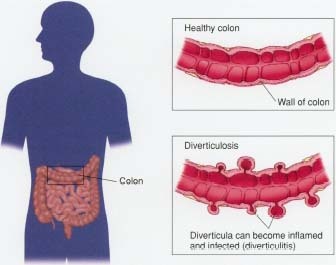Diverticulitis/Diverticulosis
Diverticulosis is the presence of diverticula (dy-ver-TIK-yoo-la) in the colon (large intestine). Diverticula are small sacs or pouches that bulge outward from the inside surface of intestinal wall. If diverticula become inflamed or infected, the resulting disease is called diverticulitis.
KEYWORDS
for searching the Internet and other reference sources
Gastrointestinal tract
Inflammation
The cause of diverticulosis is not known with certainty, but many physicians believe that it is related to too little roughage in the diet. Roughage is coarse, bulky food that is rich in plant fiber. It has been observed that people in developing countries whose diets include large amounts of plant materials (fruits and vegetables) almost never have diverticulosis.
Diverticulosis is common in the United States and in other developed countries, where refined foods often lack significant amounts of fiber. Young people rarely have diverticulosis, but it is more likely to occur as people age. By the time a person in the United States reaches the age of 80, there is more than a 50 percent chance that he or she will have diverticulosis.
What Do Diverticula Look Like?
Diverticula occur most commonly in the sigmoid colon, which is the part of the large intestine closest to the rectum. There are usually many of them, ranging from pea size or smaller to about 1 inch across. Doctors believe these pouches may form due to pressure in the lower intestine, as

How Do Doctors Diagnose and Treat Diverticula?
Symptoms
People with diverticulosis may never know they have it, because it does not always cause symptoms. Sometimes, however, the diverticula may become inflamed, causing diverticulitis. This may happen when the diverticula become plugged with wastes. The symptoms of diverticulitis include abdominal pain, fever, gas, diarrhea or constipation, and bleeding from the rectum.
Diagnosis
A doctor can find out if a person has diverticula by x-ray examination or by looking inside the colon through a viewing instrument like a sigmoidoscope (sig-MOI-do-skope) or a colonoscope (ko-LON-o-skope). Diverticula that have not caused symptoms are sometimes discovered during routine medical checkups.
Treatment
Diverticulosis does not usually require special treatment, although doctors may recommend increasing roughage in the diet. In mild cases of diverticulitis, treatment may include drinking more fluids, bed rest, and antibiotics to control infection. Sometimes doctors recommend intravenous (in-tra-VEE-nus) or IV fluids * .
* Intravenous (IV) fluids are fluids given through a flexible plastic tube into a person's vein.
Occasionally, diverticulitis may be accompanied by serious complications. If diverticula rupture (RUP-chur) or break open, intestinal contents may leak or spill out and cause an infection in the surrounding abdomen. Sometimes the intestine may become blocked or narrowed, in which case surgery may be needed.
How Are Diverticula Prevented?
Including adequate amounts of vegetable fiber in the diet is often recommended as a way to avoid diverticulosis and diverticulitis. Bran, cabbage, beans, and whole-grain breads are examples of foods high in dietary fiber. Fiber supplements are often used, particularly by older adults, to maintain regular bowel habits and to reduce the risk of diverticulitis.
See also
Constipation
Resource
Janowitz, Henry D. Your Gut Feelings. New York: Oxford University Press, 1994. A nontechnical book that includes helpful information about intestinal disorders, with a separate chapter on diverticulitis and diverticulosis.
Comment about this article, ask questions, or add new information about this topic: